Catégories
|
Catégories principales > 06 - AGRICULTURE. FORÊTS. PÊCHES > 6.2 - Politique Agricole
6.2 - Politique Agricole |
Documents disponibles dans cette catégorie (1013)
 Ajouter le résultat dans votre panier Affiner la recherche
Ajouter le résultat dans votre panier Affiner la recherche
Article
O. Xhoxhi ; E. Skreli ; E. Zhllima ; D. Imami |This paper analyses the impact of agricultural subsidies using traditional quasi-experimental research design that combines genetic matching procedure with regression analysis and causal forests, an adaptation of the random forest algorithm of B[...]
Article
M.T. Cappella ; L. Nerozzi ; M. Benini ; P. Detti ; E. Blasi |The Common Agricultural Policy (CAP) 2023-2027 introduces stringent sustainability requirements, reshaping land use and influencing crop planning and economic outcomes for European farmers. This study examines the impact of recent CAP reforms on[...]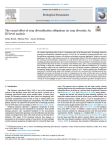
Article
The Common Agricultural Policy (CAP) is a cornerstone policy of the European Union, increasingly focused on promoting environmentally sustainable practices. In 2014, the CAP introduced Greening payments and a crop diversification requirement to [...]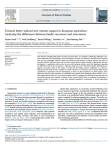
Article
S. Stork ; W. Lorleberg ; B. Pölling ; X. Yu ; J.-H. Feil |New entrants, including both family successors and newcomers, are essential to addressing challenges in European agriculture and contributing to rural development. However, the differences between these two groups have not been thoroughly explor[...]
Article
Sustainable agriculture represents a key aspect of the EU?s environmental policy, as it has a significant impact on biodiversity, soil quality, and water resources. The European Commission implements a set of policies aimed at aligning economic [...]
Article
In January 2024, widespread farmer protests across Europe exposed growing tensions between the socioeconomic realities of agricultural production and environmental policy ambitions. Among the most contested issues, pesticide use emerged as a cri[...]
Article
This article examines the rise of so-called "sustainable agriculture" projects in Tunisia after the 2011 revolution, a period of deep political and institutional change. This era opened a debate on redefining the development model, particularly [...]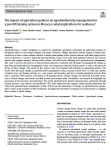
Article
Agrobiodiversity is widely recognized as essential for smallholder agriculture, particularly for enhancing resilience to disruptions which are increasingly frequent and intense. However, whether agricultural policies support or hinder agrobiodiv[...]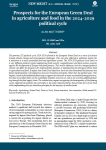
Article
The previous EU political cycle 2019-2024 ushered in the European Green Deal on a wave of activism around climate change and environmental challenges. This was also reflected in ambitious targets for a transition to a more sustainable food and a[...]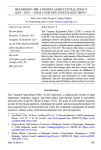
Article
The Common Agricultural Policy (CAP) is crucial for ensuring the future of agriculture and the rural development in the EU. The shortcomings of CAP in the previous period, challenges related to the global economic and geopolitical situation, the[...]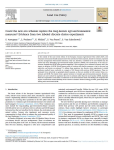
Article
In the context of the most recent reform of the European Common Agricultural Policy (2023-2027), new voluntary environment-friendly measures have been introduced. These measures, termed eco-schemes, represent one-year arrangements with limited r[...]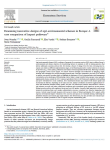
Article
S. Wunder ; C. Fraccaroli ; E. Varela ; S. Bruzzese ; M. Termansen |Agri-environmental schemes (AES), a subtype of payments for ecosystem services (PES), aim to address Europe's environmental and climate objectives by incentivising farmers to maintain or shift to farming practices that deliver additional ecosyst[...]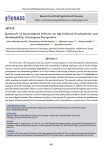
Article
F. Chatzitheodoridis ; K. Spinthiropoulos ; E. Loizou ; D. Kalfas ; S. Kalogiannidis ; E. Gortsilas |In recent years, the European Union has placed a strong emphasis on the development of government policies that promote agricultural productivity and sustainability. As global challenges such as climate change, resource scarcity, and environment[...]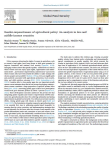
Article

Article
I. Prigoreanu ; A. Grigore-Sava ; S.C. Avarvarei ; G. Radu ; S.B. Paduraru ; R.E. Gherasim ; M. Chihulca ; G. Ignat |Introduction Sustainability in European Union (EU) agriculture has become a priority in both academic research and public policy, reflecting its central role in shaping resilient and balanced development models. The European agricultural landsca[...]
Ouvrage
V. Chatellier, dir. ; M. Pidoux, dir. ; T. Pouch, dir. ; M. Raffray, dir. | Paris [France] : Classiques Garnier | Rencontres, ISSN 2103-5636 | 2025Les politiques agricoles ont toujours fait l’objet de controverses théoriques ou politiques. Leur histoire alterne entre légitimité accordée à l’interventionnisme sur les marchés agricoles et retrait de l’État de ces marchés. Cet ouvrage revient[...]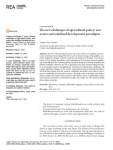
Article
The role of the agricultural sector has had to evolve as our global social economic system has been changed by drivers such as climate change, demographics, ecosystem depletion, changes in dietary patterns and rising food demand. A key character[...]
Article
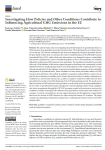
Article
F. Galioto ; I. Criscuoli ; A. Martelli ; M.V. Lasorella ; I. Falconi ; D. Marandola ; G. Dara Guccione ; F. Varia |The present study aims at investigating the potential impacts of agricultural policies on GHG emissions from agriculture across the European Union. The study begins by providing evidence on how the key CAP reforms contributed to the structural c[...]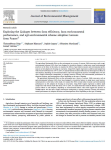
Article
T.B. Diop ; T.B. Diop ; S. Blancard ; S. Legras ; S. Marchand ; L. Védrine |The agricultural detrimental effects on the environment are a source of concern. Public mea-sures, such as agri-environmental schemes (AES), have been designed to incentivize farmers to adopt more sound environmental practices on the farm. In th[...]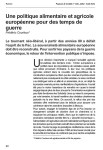
Article
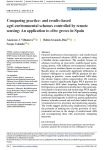
Article
Farmers' preferences toward practice- and results-based agri-environmental schemes (AES) are analysed using a labelled choice experiment. The analysis focuses on schemes involving an innovative satellite-based monitoring system, with different e[...]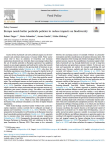
Article
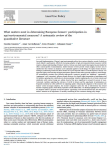
Article
Successful implementation of Europe’s agri-environmental policies faces various obstacles, several of which are closely linked to participation. Effectively increasing adoption of agri-environmental-climate measures (AECM) requires a deeper unde[...]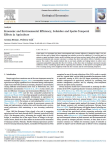
Article
In this paper, we investigate how farms' environmental and economic efficiency is shaped by Pillar I CAP subsidies over time and by spatial effects originating from subsidies received by neighbours. To reach this goal, we estimate a spatial stoc[...]
Article
Currently, policy decisions are often made based on untested scientific results. Replication studies repeat previously published research and, thus, are an effective way to test the validity and reliability of research studies, as well as to tes[...]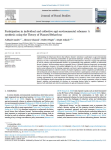
Article
A. Sander ; J. Ghazoul ; R. Finger ; S. Schaub |Understanding the behavioural factors that influence farmers' intentions to participate in agri-environmental schemes is crucial for delivering sustainability in agricultural landscapes. Drawing on a qualitative synthesis approach, we seek to un[...]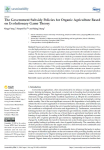
Article
Organic agriculture is a sustainable form of farming that can protect the environment. However, the high production costs of organic agriculture deter farmers from switching to organic farming. To support the development of organic agriculture, [...]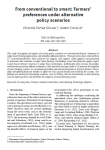
Article
This study investigates the impact of ex-ante policy scenarios on conventional farmers’ intentions to adopt smart farming applications and identifies influential factors. Through survey data collected from 117 conventional farmers, three scenari[...]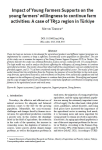
Article
There has been an increase in the demand for agricultural products and different support programs are implemented by countries to keep a sufficient, economically active population in agriculture. The aim of this study was to examine the impacts [...]








